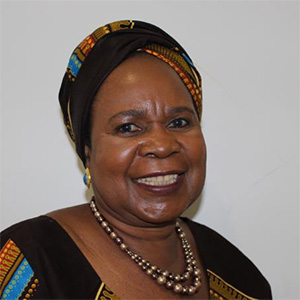Overview
Driven by her faith and passion for children’s rights, Harriet Sianjibu-Miyato has transformed the education sector in Zambia. Her achievements include huge growth in the number of community schools, and increased access to education for disadvantaged children, orphans and vulnerable children (OVC), especially girls and children with special education needs.
Career path and highlights
Prior to departure from Australia to Zambia in 1995, I co-ordinated the grant application from the United Church of Zambia (UCZ) for funding from the Uniting Church in Australia – International Mission Overseas Aid, to develop the Bissell Farm Community School under Trinity Church – UCZ in the Lusaka District. The Bissell Community School was a pilot project for the UCZ.
This saw the birth of a relationship between the two Churches and a link between the two countries (Australia and Zambia).
I was able to organise the construction of the Jordan Community School in the George Compound of the Lusaka District supported by the Uniting Church in Australia – International Mission Overseas Aid.
I was also appointed as a Consultant to Uniting Church in Australia – International Mission, to review the operations of and determine the future for the Uniting church’s involvement in the Mission at the Mwandi Community School in Southern Zambia.
In addition, after my return to Zambia, I got a job at UNICEF Lusaka-Zambia as an Education Specialist/National Programme Officer and Seconded by Government (Ministry of Education – MOE) from 1 November 1995 to 31 January 2003. While there, my Government wanted me to develop a Community Schools strategy for Zambia that would foster the provision of quality education to disadvantaged children, orphans and vulnerable children (OVC), especially girls and children with special education needs.
Through this strategy, Zambia saw the unprecedented growth of three community schools in 1995, to 3000 in 2010.
Q&A with Harriet Sianjibu-Miyato
Can you tell us about your time at Deakin? Is there anything you especially remember?
It was a great experience compounded with culture shock. I especially love that at my time there were very few African students, particularly women. I love church worship and I devoted my Sundays to church.
What has been the biggest influence on your career?
My profession as a teacher and my love for children, especially for disadvantaged children has been my biggest driving force.
Have you always wanted to pursue the kind of career you have embarked on? If so, when and how did you realise?
Yes, this is the kind of career I have always wanted to have. I have lived my dream! Firstly, becoming a teacher was the beginning of my journey to my career success. Secondly, I love working with children and this desire was enhanced by focusing my attention on the provision of education for vulnerable/disadvantaged children, especially girls and children with disabilities by increasing their access to quality education. Suffice to say, I am also from a humble background and therefore the only weapon in all my career progression has been hard work with humility, believing in myself, and being honest and accountable. Thirdly, I was privileged to have my Government’s support through Scholarships, which enabled me to excel from being a primary school teacher to a secondary school teacher; from being a lecturer in a college, to an inspector of schools at the Ministry of Education Headquarters; and finally Seconded into UNICEF as an Education Specialist/National Education officer. While in UNICEF, by virtue of my role of Propagating a Community Schools Strategy for Zambia became my niche to widen my original vision for a pilot community School that was conceptualised before leaving Australia.
How do you believe having access to a good education can be so powerful?
At my current organisation, we know that education is the key to human development. Educating the child, especially the girl child, positively changes everything, including the life of the household, community, nation, and even at an international level.
Have you faced any particular challenges along the way?
Yes, I have. Changing people’s mindset when developing programmes and achieving a positive impact through the theory of change in one of the challenges. Fundraising for sustainable community development when the global economy is dry and the advocacy and influence of government policy is another.
How would someone describe you?
A mentor, someone who goes beyond the call of duty to serve others. Strong, firm, perseverant, inspirational, passionate about children’s and human rights. Someone who exhibits tough love when coaching others.
Have there been any particular moments throughout your journey that are most memorable to you?
The transitioning from Inspector of Schools, nutrition and health education in the Inspectorate Department of the Ministry of General Education, into an Education Specialist with UNICEF. In addition, developing ZOCS from a small organisation that was only responsible for four districts, to a national organisation represented in 76 districts. ZOCS today advocated for 3000 community schools and enables 600,000 children to access education, as well as, influencing government policies.
What is something that amazes you?
The smiles on the faces of the children we serve, despite the difficulties they face. In all they go through, they are ambitious to achieve their dream.

